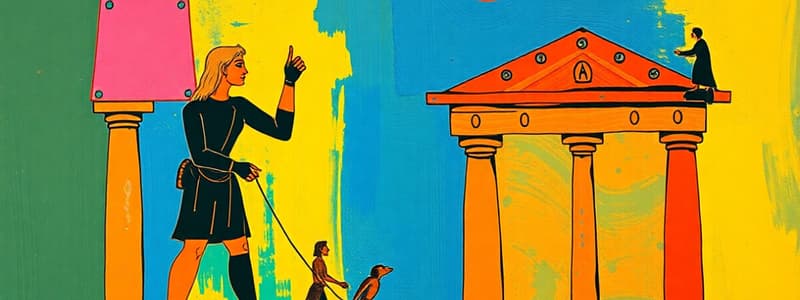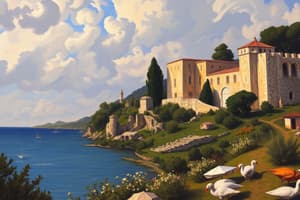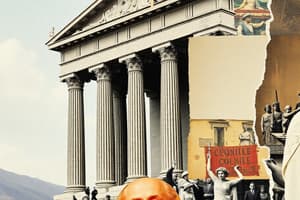Podcast
Questions and Answers
Which revolution emphasized ideals of liberty, equality, and fraternity?
Which revolution emphasized ideals of liberty, equality, and fraternity?
- The French Revolution (correct)
- The Scientific Revolution
- The Industrial Revolution
- The Protestant Reformation
Which event fundamentally reshaped European politics and society?
Which event fundamentally reshaped European politics and society?
- The Cold War
- The Scientific Revolution
- The French Revolution (correct)
- The Industrial Revolution
What characterized the advancements during the Scientific Revolution?
What characterized the advancements during the Scientific Revolution?
- Economic reforms
- Social movements
- Advancements in science and mathematics (correct)
- Political ideologies
Which historical event led to significant urbanization and the rise of factories?
Which historical event led to significant urbanization and the rise of factories?
Which two global conflicts reshaped the global political landscape in the 20th century?
Which two global conflicts reshaped the global political landscape in the 20th century?
What marked a significant turning point in early human societies?
What marked a significant turning point in early human societies?
Which civilization is known for its monumental architecture, including pyramids and temples?
Which civilization is known for its monumental architecture, including pyramids and temples?
Which of the following was a key figure in Greek philosophy?
Which of the following was a key figure in Greek philosophy?
What characterized the feudal system in medieval Europe?
What characterized the feudal system in medieval Europe?
What event marked the beginning of the Middle Ages in Europe?
What event marked the beginning of the Middle Ages in Europe?
Which period saw a renewed interest in classical learning and art?
Which period saw a renewed interest in classical learning and art?
Which of the following was a consequence of the Peloponnesian War?
Which of the following was a consequence of the Peloponnesian War?
What significant pandemic impacted European populations in the 14th century?
What significant pandemic impacted European populations in the 14th century?
Flashcards
Protestant Reformation
Protestant Reformation
A period of major religious and social change in 16th-century Europe, sparked by Martin Luther's challenges to the Catholic Church's authority.
Scientific Revolution
Scientific Revolution
A period of rapid scientific advancement in Europe, marked by discoveries in astronomy, physics, and mathematics. It replaced traditional beliefs with scientific observation and experimentation.
French Revolution
French Revolution
A major upheaval in French society, fueled by Enlightenment ideas, that overthrew the monarchy and established a republic based on the ideals of liberty, equality, and fraternity.
Industrial Revolution
Industrial Revolution
Signup and view all the flashcards
Cold War
Cold War
Signup and view all the flashcards
What is the significance of agriculture in early human history?
What is the significance of agriculture in early human history?
Signup and view all the flashcards
What is Mesopotamia known for?
What is Mesopotamia known for?
Signup and view all the flashcards
How did the transition from Roman Republic to Roman Empire impact Western Civilization?
How did the transition from Roman Republic to Roman Empire impact Western Civilization?
Signup and view all the flashcards
What is the Renaissance known for?
What is the Renaissance known for?
Signup and view all the flashcards
What is the feudal system and how did it work?
What is the feudal system and how did it work?
Signup and view all the flashcards
What defines the Age of Exploration?
What defines the Age of Exploration?
Signup and view all the flashcards
What was the Black Death and what impact did it have on Europe?
What was the Black Death and what impact did it have on Europe?
Signup and view all the flashcards
What were the Greek city-states like?
What were the Greek city-states like?
Signup and view all the flashcards
Study Notes
Ancient History
- Early human societies emerged around 2.5 million years ago, evolving from earlier hominins.
- The development of agriculture marked a turning point, leading to settled communities and the rise of early civilizations.
- Notable early civilizations include Mesopotamia, Egypt, the Indus Valley, and China, each featuring unique cultural and political structures.
- Mesopotamia saw the development of complex irrigation systems and the invention of writing.
- Ancient Egypt was famed for its monumental architecture, including pyramids and temples, and its detailed religious beliefs.
- The Indus Valley civilization demonstrated advanced urban planning and sophisticated drainage systems.
- Early Chinese civilizations developed intricate philosophies and writing systems.
Classical History
- Ancient Greece originated fundamental concepts in philosophy, democracy, and science.
- The Greek city-states (poleis) fostered vibrant cultural and intellectual life.
- Socrates, Plato, and Aristotle were key figures in Greek philosophy.
- The Peloponnesian War significantly weakened the Greek city-states.
- The Roman Republic, evolving from a monarchy, established a complex legal system and expanded through military conquest.
- The Roman Empire, inheriting from the Republic, encompassed vast territories and greatly influenced Western civilization with its law, governance, and architecture.
- Julius Caesar and Augustus were pivotal figures in Roman history.
Medieval History
- The fall of the Western Roman Empire in 476 CE marked the beginning of the Middle Ages in Europe.
- The rise of Christianity profoundly shaped medieval Europe, impacting religious practices, art, and culture.
- The feudal system, with its hierarchical structure, dominated medieval Europe.
- The Crusades, a series of religious wars, occurred between the 11th and 13th centuries.
- The Black Death, a devastating pandemic, severely impacted European populations in the 14th century.
- Key developments included the growth of universities, the development of vernacular literature, and the rise of cities.
Modern History
- The Renaissance, a period of renewed interest in classical learning and art, began in Italy in the 14th century.
- The Age of Exploration saw European powers venture globally, establishing trade routes and colonies.
- The Protestant Reformation, led by Martin Luther, challenged the Catholic Church's authority.
- The Scientific Revolution, marked by advancements in science and mathematics, transformed European thought.
- The French Revolution significantly reshaped European politics and society, with ideals of liberty, equality, and fraternity inspiring global movements.
- The Industrial Revolution led to significant economic and social changes, urbanization, and the rise of factories.
- Two World Wars dramatically reshaped global politics and led to the emergence of new global powers.
- The Cold War, a period of geopolitical tension between the US and the Soviet Union, profoundly influenced international relations.
- The 20th and 21st centuries have seen significant technological advancements, globalization, and ongoing societal change.
Studying That Suits You
Use AI to generate personalized quizzes and flashcards to suit your learning preferences.




